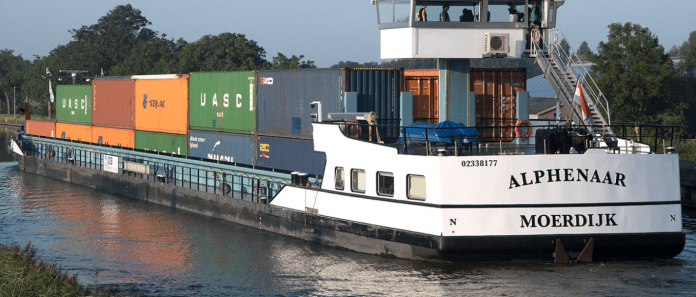
ZES to transport Heineken beers through interchangeable energy containers

Zero Emission Services (ZES) will deploy the inland vessel Aplhenaar to transport Heineken beers between Alphen aan den Rijn and Moerdijk, through containers run in batteries.
Aplhenaar is the first ship in the Netherlands to use interchangeable energy containers. The 20′ standard boxes called ‘ZESpacks’, are filled with batteries and charged with green electricity, while the first two of them are loaded and exchanged at the first charging station at the Combined Cargo Terminal (CCT) in Alphen aan den Rijn of the western Netherlands.
The company specialised in sustainable inland shipping, ZES, which was founded last year by ENGIE, ING, Wärtsilä and the Port of Rotterdam Authority with the support of the Ministry of Infrastructure and Water Management, said that the service constitutes a part of the effort to reduce emissions in inland shipping by 50% until 2030 while it is based on exchangeable energy containers with green energy and open-access charging infrastructure.
“The charging stations can act as energy hubs that can stabilise the grid during peak loads and where other vehicles can also charge. Thanks to their mobility, ZESpacks can be used to supply and store energy at all kinds of locations, such as construction sites and festivals,” stated ZES.
The new energy concept launched by ZES contributes to the reduction of emissions by saving around 1,000 tonnes of CO2 and seven tonnes of nitrogen oxides (NOx) yearly per vessel, pointed out Willem Dedden, CEO of ZES who went on to add that “ZES offers authorities and companies a ready-made solution for increasing sustainability and one of those companies is Heineken, which, together with CCT shipping, is the first ZES customer with a ten-year contract.”
Furthermore, Dedden noted that the company adapts to the needs of the new technology, as “The ZESpacks currently in use work with lithium-ion batteries, but in the future, this could also be hydrogen, ammonia or something else.”
The Rotterdam-based company aspires to be expanded in the short term with eight vessels, eight loading stations and 14 ZESpacks aiming to complete 30 zero-emission shipping routes by 2030 which can save up to 360,000 tonnes of CO2 and 2,800 tonnes of NOx.
In order to achieve the goal set in the Climate Agreement, the Green Deal for Sea Shipping, Inland Shipping and Ports to reduce emissions in inland shipping by 50% by 2030, “simultaneous action and commitment from the government, ports, terminals and the business community are required, as well as a transition to fully electrically powered waterborne transport,” explained ZEM.
Within the transport sector, inland shipping makes up 5% of CO2 emissions in the Netherlands, while 11% of the total Dutch NOx emissions are caused by inland shipping.
Source : Container News


